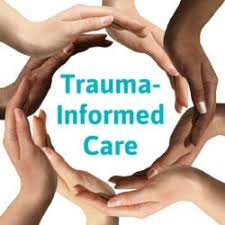Trauma Informed Care

I had an opportunity to attend a session by Jeanne Farr, CEO, National Association of Dual Diagnosis, at the Idaho Partnerships Conference on Human Services. The session was titled “Trauma-Informed Care” (TIC). Ms. Farr presented us with a comprehensive definition and history of TIC indicating reports of traumatic stress as far back in history as Word War I. We learned the high rate of trauma and people with Intellectual and Developmental Disabilities (IDD). Simply said, people diagnosed with disabilities are at a higher risk of physical, sexual abuse, and neglect. It is a valuable lesson to keep in mind that their siblings are also at a higher risk due to the fact that most abusers are close to the victims. The sad reality is that abusers are often families and many times they are paid caregivers. Ms. Farr spoke about Adverse Childhood Experiences for people with IDD and the implications of leading causes of death due to the stress, trauma and downright violence experienced by people with IDD in their lifetimes.
Ms. Farr offered insight to resilience offering the Four “R”s to trauma-informed approach. First, realization about trauma, having an understanding. Secondly, recognizing the signs of trauma. The third concept is vital, that we respond with Trauma-informed approach. Lastly, that in our lives and in our works we resist re-traumatization. We learned trauma-informed approaches for use in all aspects of our lives , it makes sense to treat EVERYONE as if trauma has possibly occurred. We have the ability, role, and even responsibility to touch people’s lives. We should choose to do so in a way that helps people feel safe, to be transparent and to develop trust in our relationships. We gained the realization that peer support has value we have the power to help create. As we support and work with people, we provide a place to build skills, develop self esteem and create opportunities for empowerment for all aspects of the person.
Ms. Farr discussed our approach as emotional human beings we increase our self awareness skills so as to avoid unintentional trauma or re-traumatization for the people in our lives then to help the people with disabilities to learn these skills as well.
We were encouraged to look for the success using respect as a fundamental aspect to weaving TIC into the services and lives of individuals we directly impact during our lives.
Ms. Farr was very knowledgeable and connected the dots well for the session’s participants to gain skillfulness and understanding regarding Trauma-Informed Care which is much needed with abuse, neglect, and injury still occurring to people with IDD who live in Idaho.


